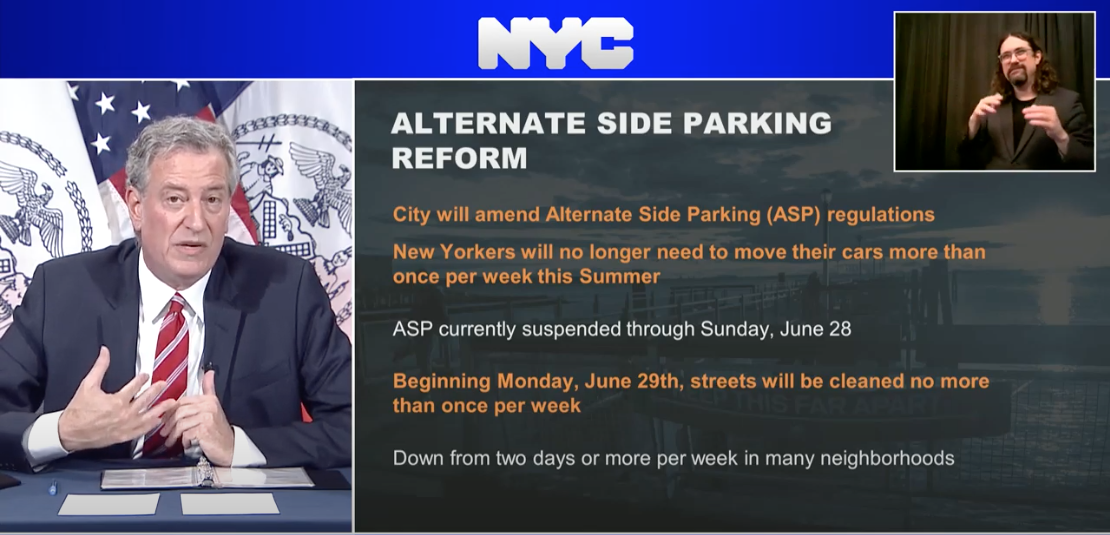After weeks of New Yorkers taking to the streets demanding an end to police brutality and justice for Black Americans, Mayor de Blasio announced what he is billing as a prime social-justice effort: turning alternate-side parking into a once-a-week affair.
"We have to change the status quo on the biggest issues of fairness and justice, and right down to the everyday issues, the kitchen-table issues, the issues that affect you and your neighborhood on your block," de Blasio told reporters on Tuesday. "So, we're rethinking alternate-side parking."
The historic new alternate-side parking rules mean that on streets where street cleaning rules were in effect two days per week, car owners will only need to move their vehicles on the later cleaning days (so Thursdays on blocks that are now Monday/Thursday cleaning days and Fridays on blocks that are now Tuesday/Friday cleaning days, and so on). According to a press release from the mayor's office, the move will affect more than 2,300 miles of roadway in the city.
The move will no doubt rankle the several Manhattan community boards that have voted to study the uses of their curbs in order to find more efficient and public-spirited uses for them than private car storage. Naturally, the city's most put-upon demographic — New Yorkers who spend more than $10,000 a year for garage parking — rejoiced at the announcement.
OMG THIS IS LIFE CHANGING. Any New Yorker with a car who doesn’t want to pay $1k a month for a garage space will agree. https://t.co/5HdbE2z7H5
— Erika Leigh (@_ErikaLeigh) June 23, 2020
The move won't have much of an effect on car ownership in the city, according to TransitCenter communications director Ben Fried, but Fried tweeted that it feels like a misplaced priority as more New Yorkers head back to work on buses that are going to be caught in the traffic jams that the mayor is happy to see return to the streets.
Transportation impact of this change likely to be minimal, but as a statement of mayoral perspective, this is tone-deaf, at best, when New Yorkers are watching bus service deteriorate day by day as traffic swamps the streets. https://t.co/UsV5UYSqgB
— TransitCenter (@TransitCenter) June 23, 2020
The announcement comes after the mayor spent weeks talking about parking, and alternate-side parking especially, as if it were something that keeps New Yorkers awake at night. De Blasio, who tools around the city in a suburban-sized SUV — has relished the moments in his daily briefings when he's been able to tell New Yorkers that alternate-side parking was suspended, and went as far as saying "I think alternate-side parking is right up there with Satan in most people's views" at a press conference last Friday. The mayor also said "New Yorkers are New Yorkers and parking is very, very precious to us," on Monday morning as he spoke about the city's new outdoor seating plan, an echo of the time he said "We're all New Yorkers, we are all concerned about parking" while he talked about placard abuse.
Millions of New Yorkers in Manhattan, the Bronx and Brooklyn don't worry much about parking. Data show that in rich and poor neighborhoods across the city, only a minority of households own vehicles and people greatly outnumber cars, unlike in say, the Long Island suburbs.
78% of people in Manhattan
— Rich Mintz (@richmintz) June 22, 2020
60% of people in the Bronx
56% of people in Brooklyn
literally do not give two shits about parking https://t.co/MMIoVtvZGm
For areas with high car-ownership rates, the mayor's ASP reform will spell relief from parking tickets. But even in Queens, where 63.2 percent of houses have access to at least one vehicle, only 32.5 percent of working residents in the borough drive alone to work, according to the NYC Planning Population FactFinder. Which ultimately means the ASP switch is more of a reward for those New Yorkers who can take time once or twice a week to sit in a double parked car on the street until the alternate-side hours are over. So in that way — like the 3 million unmetered parking spaces across the city — it amounts to middle-class welfare.
Current and former alternate-side parkers wondered why the rule was announced now and how much of a social-justice victory the rules tweak really was.
Also-and I say this as a car owner- why is this the priority? Instead the focus should be on expanding bus lanes and bike lanes to give people more travel options.
— Amy (@ammd111) June 23, 2020
As someone who used to store a car he barely used on a New York City street for free, I can tell you that Alternate Side Parking was a huge pain in the ass, but I never deluded myself into thinking it was this unfair burden placed upon me vs the price of me gaming the system.
— Michael Tae Sweeney (@mtsw) June 23, 2020
So maybe the emphasis on alternate side parking as a social-justice issue is just a tad out of touch. But at least a city where residents are on edge over nightly amateur fireworks aren't going to have to contend with even larger and unexpected explosions in the sky soon. No one in charge of New York could possibly think that would be a good thing to announce, would they?






